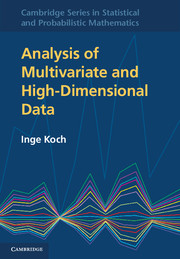Book contents
- Frontmatter
- Dedication
- Contents
- List of Algorithms
- Notation
- Preface
- I Classical Methods
- II Factors and Groupings
- 5 Norms, Proximities, Features and Dualities
- 6 Cluster Analysis
- 7 Factor Analysis
- 8 Multidimensional Scaling
- Problems for Part II
- III Non-Gaussian Analysis
- Problems for Part III
- References
- Author Index
- Subject Index
- Data Index
5 - Norms, Proximities, Features and Dualities
from II - Factors and Groupings
Published online by Cambridge University Press: 05 June 2014
- Frontmatter
- Dedication
- Contents
- List of Algorithms
- Notation
- Preface
- I Classical Methods
- II Factors and Groupings
- 5 Norms, Proximities, Features and Dualities
- 6 Cluster Analysis
- 7 Factor Analysis
- 8 Multidimensional Scaling
- Problems for Part II
- III Non-Gaussian Analysis
- Problems for Part III
- References
- Author Index
- Subject Index
- Data Index
Summary
Get your facts first, and then you can distort them as much as you please (Mark Twain, 1835–1910).
Introduction
The first part of this book dealt with the three classical problems: finding structure within data, determining relationships between different subsets of variables and dividing data into classes. In Part II, we focus on the first of the problems, finding structure – in particular, groups or factors – in data. The three methods we explore, Cluster Analysis, Factor Analysis and Multidimensional Scaling, are classical in their origin and were developed initially in the behavioural sciences. They have since become indispensable tools in diverse areas including psychology, psychiatry, biology, medicine and marketing, as well as having become mainstream statistical techniques. We will see that Principal Component Analysis plays an important role in these methods as a preliminary step in the analysis or as a special case within a broader framework.
Cluster Analysis is similar to Discriminant Analysis in that one attempts to partition the data into groups. In biology, one might want to determine specific cell subpopulations. In archeology, researchers have attempted to establish taxonomies of stone tools or funeral objects by applying cluster analytic techniques. Unlike Discriminant Analysis, however, we do not know the class membership of any of the observations. The emphasis in Factor Analysis and Multidimensional Scaling is on the interpretability of the data in terms of a small number of meaningful descriptors or dimensions.
Information
- Type
- Chapter
- Information
- Analysis of Multivariate and High-Dimensional Data , pp. 175 - 182Publisher: Cambridge University PressPrint publication year: 2013
